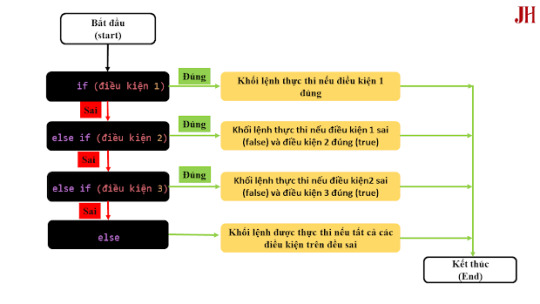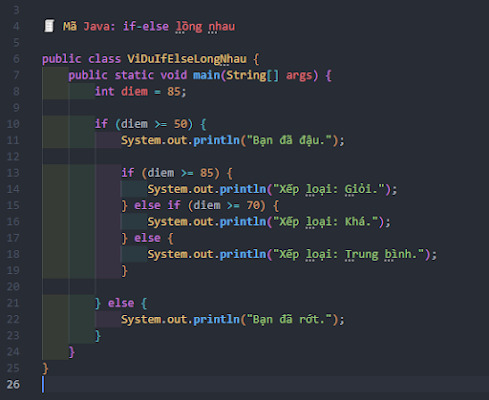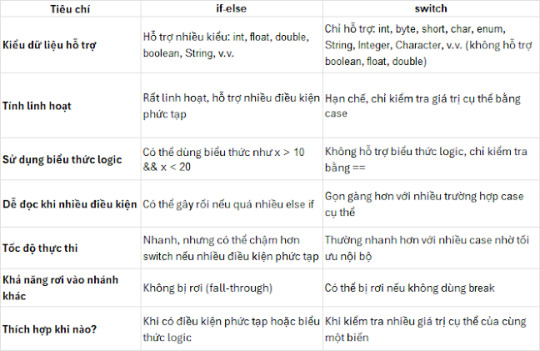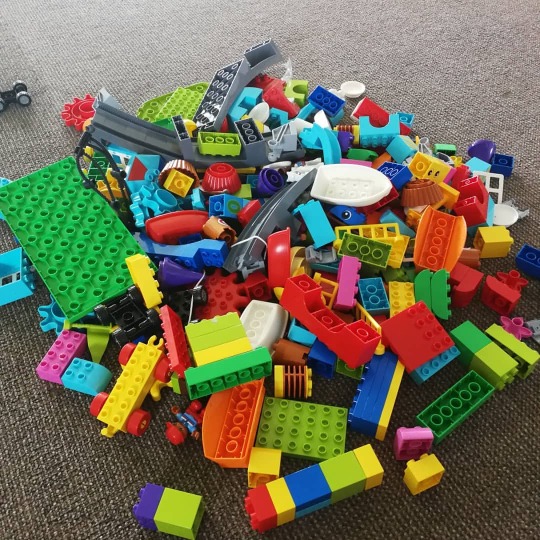#conditionalstatements
Explore tagged Tumblr posts
Text
Câu Lệnh if-else Trong Java - Hướng Dẫn Chi Tiết
Câu lệnh if-else trong Java là một trong những cấu trúc điều khiển luồng cơ bản nhất, giúp lập trình viên đưa ra quyết định dựa trên các điều kiện cụ thể. Trong bài viết này, chúng ta sẽ tìm hiểu chi tiết về câu lệnh if-else, cách sử dụng, các dạng khác nhau, và ví dụ minh họa. Nếu bạn đang bắt đầu học Java hoặc muốn củng cố kiến thức, bài viết này sẽ là hướng dẫn toàn diện dành cho bạn.

Ảnh mô tả cách xử lí điều kiện và thực thi khối lệnh của câu lệnh điều kiện.
1. Câu lệnh if-else trong Java là gì?
Câu lệnh if-else là một cấu trúc điều kiện trong Java, cho phép chương trình thực thi một khối mã nếu điều kiện được đáp ứng hoặc thực thi một khối mã khác nếu điều kiện không thỏa mãn. Đây là công cụ quan trọng để kiểm soát luồng thực thi trong lập trình.
Cú pháp cơ bản của câu lệnh if-else:
if (điều_kiện) {
// Khối mã thực thi nếu điều kiện đúng
} else {
// Khối mã thực thi nếu điều kiện sau
}
điều_kiện: Một biểu thức logic trả về giá trị true hoặc false.
Nếu điều kiện là true, khối mã trong if được thực thi.
Nếu điều kiện là false, khối mã trong else (nếu có) sẽ được thực thi.
2. Các dạng của Câu lệnh if-else trong Java
Câu lệnh if-else có nhiều dạng khác nhau, tùy thuộc vào yêu cầu của chương trình. Dưới đây là các dạng phổ biến:
2.1. Câu lệnh if đơn giản
Dạng cơ bản nhất, chỉ kiểm tra một điều kiện và thực thi khối mã nếu điều kiện đúng.
int age = 18;
if (age >= 18) {
System.out.println("Bạn đủ tuổi lái xe!");
}
2.2. Câu lệnh if-else
Bao gồm cả khối else để xử lý trường hợp điều kiện sai.
int age = 16;
if (age >= 18) {
System.out.println("Bạn đủ tuổi lái xe!");
} else {
System.out.println("Bạn chưa đủ tuổi lái xe!");
}
2.3. Câu lệnh if-else lồng nhau
Dùng để kiểm tra nhiều điều kiện phức tạp.
int score = 85;
if (score >= 90) {
System.out.println("Xuất sắc!");
} else if (score >= 75) {
System.out.println("Tốt!");
} else if (score >= 60) {
System.out.println("Đạt!");
} else {
System.out.println("Cần cải thiện!");
}
2.4. Câu lệnh if với toán tử logic
Kết hợp các điều kiện bằng toán tử logic như && (và), || (hoặc), ! (không).
int age = 20;
boolean hasLicense = true;
if (age >= 18 && hasLicense) {
System.out.println("Bạn được phép lái xe!");
} else {
System.out.println("Bạn không được phép lái xe!");
}

Minh họa câu lệnh if-else lồng nhau
3. Ứng dụng thực tế của Câu lệnh if-else
Câu lệnh if-else được sử dụng rộng rãi trong các ứng dụng Java, từ các chương trình đơn giản đến các hệ thống phức tạp. Dưới đây là một số ví dụ:
Kiểm tra đầu vào người dùng: Xác thực thông tin như tuổi, mật khẩu, hoặc quyền truy cập.
Xử lý logic trò chơi: Quyết định hành động của nhân vật dựa trên điều kiện (ví dụ: nếu nhân vật hết máu, trò chơi kết thúc).
Quản lý nghiệp vụ: Phân loại khách hàng dựa trên điểm số hoặc doanh thu.
Ví dụ: Chương trình kiểm tra số chẵn/lẻ.
import java.util.Scanner;
public class EvenOdd {
public static void main(String[] args) {
Scanner scanner = new Scanner(System.in);
System.out.print("Nhập một số: ");
int number = scanner.nextInt();
if (number % 2 == 0) {
System.out.println(number + " là số chẵn.");
} else {
System.out.println(number + " là số lẻ.");
}
}
}
4. Lưu ý khi sử dụng Câu lệnh if-else
Để sử dụng câu lệnh if-else trong Java hiệu quả, bạn cần lưu ý:
Tránh lồng quá nhiều điều kiện: Lồng quá nhiều if-else có thể làm mã khó đọc. Hãy cân nhắc sử dụng switch hoặc các hàm riêng cho logic phức tạp.
Kiểm tra điều kiện rõ ràng: Đảm bảo điều kiện trong if trả về giá trị true/false chính xác.
Sử dụng dấu ngoặc {}: Ngay cả khi khối mã chỉ có một dòng, việc sử dụng {} giúp mã rõ ràng và tránh lỗi.
Tối ưu hóa hiệu suất: Với các điều kiện phức tạp, sắp xếp thứ tự kiểm tra để giảm số lần đánh giá.

Bảng so sánh giữa câu lệnh if-else và switch
5. Kết luận
Câu lệnh if-else trong Java là một công cụ mạnh mẽ, cho phép lập trình viên kiểm soát luồng chương trình một cách linh hoạt. Từ các ứng dụng đơn giản như kiểm tra số chẵn/lẻ đến các hệ thống phức tạp, if-else luôn đóng vai trò quan trọng. Hy vọng bài viết này đã giúp bạn hiểu rõ cách sử dụng câu lệnh if-else, các dạng khác nhau, và cách áp dụng chúng hiệu quả.
Hãy thực hành với các ví dụ trong bài và thử viết các chương trình sử dụng if-else để làm quen. Nếu bạn có thắc mắc hoặc cần thêm ví dụ, hãy để lại câu hỏi nhé!
🔹 Câu lệnh if-else trong Java – Hướng dẫn chi tiết cho người mới bắt đầu Tìm hiểu cách sử dụng if, else if, và else để xây dựng điều kiện logic trong lập trình Java. Ví dụ minh họa rõ ràng, dễ hiểu, áp dụng thực tế ngay! 🌍 Website: Java Highlight
#JavaHighlight#ifelseJava#JavaBasic#JavaTutorial#LapTrinhJava#JavaForBeginners#ConditionalStatements#Javacoban#JavaLearning#Câu lệnh if-else trong Java
0 notes
Text
A Step-by-Step Guide to Java Conditional Statements
Discover the power of Java conditional statements like if, else, switch, and more. Learn how to control program flow with these essential tools in Java programming.
0 notes
Text
Mastering Python Conditionals – A Beginner’s Guide
In my latest YouTube video, I break down conditional statements in Python — the building blocks of decision-making in code.
What you’ll learn:
Using if, elif, and else to control program flow
Logical operators like and, or, not
Comparison operators like ==, !=, >, <
Writing nested conditionals for multi-level decisions
Fun mini-projects: Odd/Even Checker and Grade Categorizer
Example Code:
num = int(input("Enter a number: "))
if num % 2 == 0:
print("Even")
else:
print("Odd")
Whether you're new to coding or brushing up your basics, this is the perfect place to start.
Watch the full tutorial now
youtube
#Python #Programming #CodingTutorial #LearnToCode #CodeNewbie #PythonBasics #ConditionalStatements #PythonTips #TechEducation #AjayrajNadar #TumblrTech
1 note
·
View note
Text
youtube
Welcome to Naidu Tutorials, your go-to destination for high-quality SAS training! In Part 15 of our comprehensive 30-Hour Complete SAS Training series, we will focus on the indispensable aspect of conditional statements in SAS. These essential programming constructs allow you to control the flow of your SAS programs, enabling you to implement complex logic and decision-making processes.
#SASTutorial#ConditionalStatements#SASProgramming#SASTraining#DataAnalytics#SASCourse#SASCertification#LearnSAS#NaiduTutorials#CompleteSASTraining#SASConditionalStatements#SASLogic#SASDataHandling#SASLessons#SASFunctions#SASBasics#SASAdvanced#SASProgrammer#SASExpert#SASControlStructures#SASDecisionMaking#SASCodeOptimization#Youtube
0 notes
Photo

Conditional Statements, Imagine, a day at school or at home. There is a certainty you have some rules to follow. When you are currently at the school, you are likely to have some certain classroom rules. Like, when to use the School Wi-Fi, where you put your belongings or when you can have lunch. At home, the rule can be never playing loud music. Or you only get permission to use your laptop at a certain time. It's important to understand computer follow rules too. A computer program runs due to bases of rules written in codes by a programmer. A computer will follow the rules or instructions in the program, exactly as they are written. Key Points 1. What Are Conditional Statements In Coding ? 2. Why Is Using A Condition Important In Your Codes And Examples ? 3. Summary Of Conditional Statements In Coding. Click the link to be brightened or copy and paste the link to search bar to be brightened: https://webbikon.com/blog/2022/11/06/conditional-statements-in-coding-and-examples/ #webbikontechnologies #bestwebdesigncompanyinabraka #conditionalstatements #conditions #coding #programming #ifelse #webdevelopment #python #javascript #backenddeveloper #frontendeveloper #chicago #neworleans https://www.instagram.com/p/CkmyUsXol3p/?igshid=NGJjMDIxMWI=
#webbikontechnologies#bestwebdesigncompanyinabraka#conditionalstatements#conditions#coding#programming#ifelse#webdevelopment#python#javascript#backenddeveloper#frontendeveloper#chicago#neworleans
0 notes
Text
Ques: To make a menu driven calculator using conditional statement in c++.

https://mytechcode.com/conditional-statement-in-c-its-questions/
#design#education#science#technology#machine#coding#contentcreator#programming#website#python#Java#Javascript#conditional formatting#conditionalstatements
0 notes
Photo

Let's do this! 💪 #LetsBuildTogether #TryMoreDiscoverMore #LEGOlearning #legoeducation #stemmom #steameducation #STEAM #steameducation #CODINGEXPRESS #earlycodingconcepts #sequencing #looping #conditionalstatements #livingmypassion #gratefullness #ikikids #contactus #ikigaiengineering (at Reddford House The Hills) https://www.instagram.com/p/B78ODmIAGuJ/?igshid=1g2bacqu46tol
#letsbuildtogether#trymorediscovermore#legolearning#legoeducation#stemmom#steameducation#steam#codingexpress#earlycodingconcepts#sequencing#looping#conditionalstatements#livingmypassion#gratefullness#ikikids#contactus#ikigaiengineering
0 notes
Photo

This is so cool!
5 notes
·
View notes
Video
instagram
Remember the good ol’ times of getting together with classmates to make a fun video for your geometry class?..... oh wait! That NEVER happened! #smartgirls #ibprogram #creativelearning #conditionalStatements in #geometry https://www.instagram.com/p/BoC6gUygu2G/?utm_source=ig_tumblr_share&igshid=1x6maj4sbuwjp
0 notes
Text
Analogically, if Tensorflow is the extravagant building that stands firm and tall. Python constitutes the roots that support it.
Therefore, the GDSC has arranged a session on the basics of Python Language, as the 4th edition in the Tensorflow Bootcamp Workshops.
The utmost fundamentals, the building blocks of your code ie: datatypes, several types of loops, conditional statements and Functions, are going to be discussed in detail. And as students, we've been listening to the emphasis laid on the importance of basics since 1947.
So we call out all those who are ambitious to grow to attend this session. Specially, the freshmen (since their course includes a touch of Python). Python being the most fascinating language there is; make sure you don't miss out on the opportunity.
🕐Tuesday, December 7, 2021 from 3:00 PM - 4:00 PM GMT +0500.
Register here: https://tinyurl.com/GDSCTF03
Stream the session live at: https://meet.google.com/awn-ifrf-rqo
#TensorFlow #dataanlytics #dataanalysis #datascience #python #pythonprogramming #function #loops #conditionalstatements #datatypes #GoogleDeveloperStudentClubs #GDSCNUCES #gdsc #GoogleDSC #GoogleDevelopersGroup #GDSCNUCESKHI #FASTNU #Google #training #workshop #Bootcamp #community

0 notes
Text
Top 5 Java Conditional Statement Tricks You Should Know
Learn how to use Java conditional statements like if, else, and switch to control the flow of your program. Master decision-making in Java with easy-to-follow examples.
0 notes
Text
Syllabus
DIG 1710: Introduction to Game Design Professor Mark Simpson
_________________________
Important Dates
Class Sessions:
Monday 5:30pm-8:50pm in Room 8109
Tuesday/Thursday 2:20-4:00pm in Room 3410 Fall Term: August 28th – December 15th 2017 Final Exam Week: December 18-22 (Monday-Friday)
Last day to drop with refund: September 1 (Friday)
MDC Holidays Fall 2017 September 2-4 (Saturday-Monday) November 10-12 (Friday- Sunday) November 23 Thanksgiving
Website: dig1710.tumblr.com
Required Materials
Textbook: The Art of Game Design: A Book of Lenses
Flash Drive and/or cloud storage
Tumblr account & blog dedicated to this class
Class Competencies
Competency 1: The student will demonstrate how to evaluate game concepts by:
Comparing different game concepts.
Composing a game concept document.
Presenting and justifying the game concept.
Identifying and comparing the different genres of games.
Competency 2: The student will demonstrate an understanding of various tools that are used in game development by:
Identifying different computer programming languages used for game development.
Reviewing different development environments for game development.
Studying automation software for game and software development.
Competency 3: The student will demonstrate an understanding of the game development process by
Distinguishing the different stages of the game development process.
Creating a generic plan for developing a game.
Competency 4: The student will demonstrate an understanding of 3D computer environments by:
Reproducing simple objects in different coordinate systems.
Manipulating screen coordinates to create new game levels.
Converting and exporting objects and levels between different 3D environments.
Competency 5: The student will demonstrate an understanding of game development tools by:
Creating simple shapes and structures that can be exported to games or game editors.
Modifying an existing level in a game using editing tools.
Creating a level that can be ported to an existing game engine or editor.
Competency 6: The student will demonstrate an understanding of how to analyze the different uses of textures by:
Creating texture maps for object in games.
Modifying existing texture maps to work with new designs.
Applying new textures for changing the look and feel of existing game levels.
Distinguishing between the different types of texture mappings.
Competency 7: The student will demonstrate an understanding of level design, creation tools, and editors by:
Distinguishing the different level building tools.
Examining the game development process and application to help design new tools for building levels
Competency 8: The student will demonstrate an understanding how to design game levels by:
Distinguishing the different types of levels in terms fun factor.
Discussing how to decrease and increase the difficulty for player each type of game level.
Creating a new level for an existing game, that is going to address all the issues of difficulty.
Competency 9: The student will demonstrate an understanding of how to export created levels to existing game engines by:
Creating building blocks for game level editors and existing engines.
Creating programs that will be able to convert and export levels into game engines and level editors.
Modifying existing items to make them exportable in to game engines and level editors.
Competency 10: The student will demonstrate an understanding of game development by:
Creating conditionalstatements and loops for games.
Modifying sprites to add simple motion to games.
Developing a simple 2D side scrolling game using a game development software kit.
Grades
Mid-Term 20% Final 30% Homework 35% Attendance 15% (subject to change)
GRADING SCALE
A 100 - 90 B 80 - 89 C 70 – 79 D 60 – 69 F 0 - 59
COURSE POLICIES:
Attendance Policy:
Students are expected to attend all the classes.
Class attendance and participation is pre-supposed and strongly recommended.
Attendance will be taken each class session and students are expected to attend all scheduled class sessions.
To obtain credit for attendance; students must sign the attendance “sheet” distributed in class.
If absent, it is your responsibility to keep fully informed about the notes, class material discussed (including syllabus adjustments, additional reading assignments, changes in examination material and dates, etc.).
Students who stop attending class will receive a letter grade of “F” for the course unless they submit a drop card to the Registrar’s office prior to the withdrawal deadline date.
If you will be absent from class for any reason, please message me in advance.
Lectures are given at the beginning of the class, therefore, if a student is absent during the lecture portion of the class, it is his/her responsibility to cover/study the material that is missed.
Late homework is subject to a 10% late penalty for each day it is late.
No homework may be submitted more than 1 week late.
Academic Dishonesty Procedure:
Academic dishonesty is defined as an action inconsistent with the ethical standards of Miami Dade College. Academic dishonesty includes the following actions, as well as other similar conduct aimed at making false representation with respect to a student’s academic performance.
Collaborating with others in work to be presented, if contrary to the stated rules of the course.
Plagiarizing, including the submission of other’s ideas or papers (whether purchased, borrowed, or otherwise obtained) as one’s own.
Submitting, if contrary to the rules of a course, work previously presented in another course.
Knowingly and intentionally assisting another student in any of the above actions, including assistance in an arrangement whereby any work, classroom performance, examination, or other activity is submitted or performed by a person other than the student under whose name the work is submitted or performed. Some actions of academic dishonesty, such as stealing examinations or course material and falsifying records, may be processed through the Student Disciplinary Procedure.
The Student Disciplinary Procedure may be found on the Student’s Rights & Responsibilities Guide (page 20).
Students are to work individually during lab hours, unless otherwise instructed.
If the prohibited behavior continues, the student may receive an an “F” for the course.
Copying Project Files from another student is prohibited; both students, the author and whoever copied, will earn a grade of “F” for that assignment or exam.
Course Withdrawal:
A student not completing the course for any reason is required to submit an official drop notice to the Registrar’s office.
If a student decides to withdraw; it is the responsibility of the student to do so by the course withdrawal date provided on the College Academic Calendar.
If a student stops attending this class, the student may be dropped from the course without notice and the student’s record will show a grade of “IW” (Instructor Withdrawal).
Students are responsible for checking the College Academic Calendar for refund and course withdrawal deadline dates.
Incomplete Grade:
In this class, an “Incomplete” or “I” grade is not usually given.
An incomplete grade (“I” grade) is only available at the discretion of the instructor; as a result of a documented emergency that prohibits your completing the course.
The “I” grade applies to students that cannot submit the final project.
Students will only be considered for an incomplete grade if it is beyond the course withdrawal date and the student is passing the course at the time of the request.
The instructor and the student will complete an Agreement for Grade of Incomplete form.
This agreement will determine the requirements for a course grade which must be completed by the end of the next major term or a failing grade will be assigned.
CLASSROOM POLICIES:
1. Electronic (cellphones, iPods…etc.) devices are to be either turned off or in silent mode.
2. NO electronic (cellphones, mp3, etc.) devices are allowed during lecture.
3. Eating, drinking, chewing gum, or smoking is strictly prohibited in the electronic classroom.
4. All food items such as soda cans, gum, food wrappings…etc. should be disposed of prior to entering the electronic classroom.
5. Behavior in the electronic classroom is expected that will allow for conditions that foster learning and a free exchange of ideas. A positive learning atmosphere is one that shows respect and courtesy for the instructor and fellow students. For example, such things as whispering, sleeping, working on other subject matters, or interrupting students or instructor, will not be tolerated.
6. Students will be punctual. Being late to a class is disruptive and rude to both the instructor and to the rest of the class.
7. Personal matters will be discussed with the instructor outside of class. Either right outside the electronic classroom or in the instructor’s office. 1. Distinguishing the different stages of the game development process. 2. Creating a generic plan for developing a game.
0 notes
Photo

🎓 Graduation time!! 🎓 Today our first group of early learners who completed all modules for our programme received their certification. We are so proud of the progress that the learners made and we wish them all the best in their next year. Have a fantastic holiday! Contact us for more information on our programme and enhance your school's curriculum. #Graduation #LetsBuildTogether #TryMoreDiscoverMore #LEGOlearning #legoeducation #stemmom #steameducation #STEAM #steameducation #CODINGEXPRESS #earlycodingconcepts #sequencing #looping #conditionalstatements #livingmypassion #gratefullness #ikikids #contactus #ikigaiengineering (at Reddford House The Hills) https://www.instagram.com/p/B5a2eYRAGUY/?igshid=1j9v5sxgcgg9w
#graduation#letsbuildtogether#trymorediscovermore#legolearning#legoeducation#stemmom#steameducation#steam#codingexpress#earlycodingconcepts#sequencing#looping#conditionalstatements#livingmypassion#gratefullness#ikikids#contactus#ikigaiengineering
0 notes
Photo

IKI KIDS uses tools to teach young learners in a creative, intuitive and versatile manner early coding concepts that naturally sparks their curiosity, creativity and desire to explore and learn together! Today the kids learnt about traffic signs and rules of the road. In doing so they explored the concepts of coding, Identified cause and effect relationships, Made predictions, used strategies and planning in order to solve problems, designed and expressing ideas using digital tools and technology. Contact us for more information on our programme and enhance your school's curriculum. #LetsBuildTogether #TryMoreDiscoverMore #LEGOlearning #legoeducation #stemmom #steameducation #STEAM #steameducation #CODINGEXPRESS #earlycodingconcepts #sequencing #looping #conditionalstatements #livingmypassion #gratefullness #ikikids #contactus #ikigaiengineering (at Reddford House The Hills) https://www.instagram.com/p/B42ZGZRA65D/?igshid=oes9ct8ofyir
#letsbuildtogether#trymorediscovermore#legolearning#legoeducation#stemmom#steameducation#steam#codingexpress#earlycodingconcepts#sequencing#looping#conditionalstatements#livingmypassion#gratefullness#ikikids#contactus#ikigaiengineering
0 notes
Photo

IKI KIDS introduces learners from the age of 2 to 5 years to Science, Technology, Engineering, Arts and Mathematics (STEAM) principles via the art of play. In class this week we learnt simple concepts of number recognition, sequencing of events, designing and expressing ideas using digital tools and technology, oeoblem solving and the cause and effect relationship. Contact us for more information on our programme and enhance your school's curriculum. #LetsBuildTogether #TryMoreDiscoverMore #LEGOlearning #legoeducation #stemmom #steameducation #STEAM #steameducation #CODINGEXPRESS #earlycodingconcepts #sequencing #looping #conditionalstatements #livingmypassion #gratefullness #ikikids #contactus #ikigaiengineering https://www.instagram.com/p/B4ltojxgOvV/?igshid=1sqopsycxweo7
#letsbuildtogether#trymorediscovermore#legolearning#legoeducation#stemmom#steameducation#steam#codingexpress#earlycodingconcepts#sequencing#looping#conditionalstatements#livingmypassion#gratefullness#ikikids#contactus#ikigaiengineering
0 notes
Photo

IKI KIDS will be spreading it's wings moving into more schools in 2020. Coding and Robotics will now become of early childhood education curriculum. This is exactly what IKI KIDS has been coaching in the last year. Our classes run from ages 2-5 - the foundation years. Contact us for more information and how we can be part of your school's extra curricular activities. "As part of plans to future-proof the economy, president Cyril Ramaphosa has pledged to introduce a number of technology-focused subjects to the curriculum. In April 2019, the Department of Basic Education said it had trained 43,774 teachers in computer skills and would shortly begin training teachers for the new coding curricula. The minister said that the DBE will also be introducing a *robotics* curriculum from Grade R-9." https://businesstech.co.za/news/government/350805/the-big-changes-coming-to-south-african-schools/ #LetsBuildTogether #TryMoreDiscoverMore #LEGOlearning #legoeducation #stemmom #STEAM #steameducation #CODINGEXPRESS #earlycodingconcepts #sequencing #looping #conditionalstatements #livingmypassion #gratefulness #ikikids https://www.instagram.com/p/B4atFcGgX4w/?igshid=44edoohv2642
#letsbuildtogether#trymorediscovermore#legolearning#legoeducation#stemmom#steam#steameducation#codingexpress#earlycodingconcepts#sequencing#looping#conditionalstatements#livingmypassion#gratefulness#ikikids
0 notes